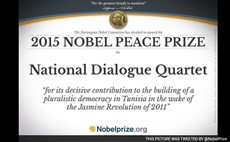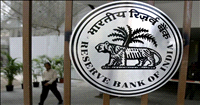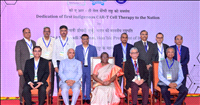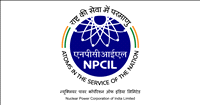Nobel Peace Prize for Tunisia’s National Dialogue Quartet
09 Oct 2015
The Norwegian Nobel Committee has decided to award the Nobel Peace Prize for 2015 to the Tunisian National Dialogue Quartet for its decisive contribution to the building of a pluralistic democracy in Tunisia and saving the country from disintegration in the wake of the Jasmine Revolution of 2011.
 The Nobel Peace Prize 2015 was awarded to Tunisia's National Dialogue Quartet "for its decisive contribution to the building of a pluralistic democracy in Tunisia in the wake of the Jasmine Revolution of 2011," the committee said in a release.
The Nobel Peace Prize 2015 was awarded to Tunisia's National Dialogue Quartet "for its decisive contribution to the building of a pluralistic democracy in Tunisia in the wake of the Jasmine Revolution of 2011," the committee said in a release.
The Quartet was formed in the summer of 2013 when the democratisation process was in danger of collapsing as a result of political assassinations and widespread social unrest. It established an alternative, peaceful political process at a time when the country was on the brink of civil war. It was thus instrumental in enabling Tunisia, in the space of a few years, to establish a constitutional system of government guaranteeing fundamental rights for the entire population, irrespective of gender, political conviction or religious belief.
The National Dialogue Quartet comprises four key organizations in Tunisian civil society:
- Tunisian General Labor Union (UGTT, Union General Tunisians du Travail)
- Tunisian Confederation of Industry, Trade and Handicrafts (UTICA, Union Tunisians de l'Industrie, du Commerce et de l'Artisanat)
- Tunisian Human Rights League (LTDH, La Ligue Tunisienne pour la Défense des Droits de l'Homme), and
- Tunisian Order of Lawyers (Ordre National des Avocats de Tunisie).
These organisations represent different sectors and values in Tunisian society - working life and welfare, principles of the rule of law and human rights. On this basis, the Quartet exercised its role as a mediator and driving force to advance peaceful democratic development in Tunisia with great moral authority, the committee noted.
''The Nobel Peace Prize for 2015 is awarded to this Quartet, not to the four individual organisations as such,'' it added.
It was in Tunisia that the Arab Spring originated in 2010-2011, although it quickly spread to a number of countries in North Africa and the Middle East.
However, in many of these countries, the struggle for democracy and fundamental rights has come to a standstill or suffered setbacks. Tunisia, however, has seen a democratic transition based on a vibrant civil society with demands for respect for basic human rights.
An essential factor for the culmination of the revolution in Tunisia in peaceful, democratic elections last autumn was the effort made by the Quartet to support the work of the constituent assembly and to secure approval of the constitutional process among the Tunisian population at large.
''The Quartet paved the way for a peaceful dialogue between the citizens, the political parties and the authorities and helped to find consensus-based solutions to a wide range of challenges across political and religious divides. The broad-based national dialogue that the Quartet succeeded in establishing countered the spread of violence in Tunisia and its function is therefore comparable to that of the peace congresses to which Alfred Nobel refers in his will.''
The course of events that have taken place in Tunisia since the fall of the authoritarian Ben Ali regime in January 2011 is unique and remarkable for several reasons. It showed above all that Islamist and secular political movements can work together to achieve significant results in the country's best interests.
Tunisia faces significant political, economic and security challenges. The Norwegian Nobel Committee said it hoped the prize to contribute towards safeguarding democracy in Tunisia and be an inspiration to all those who seek to promote peace and democracy in the Middle East, North Africa and the rest of the world.













.jpg)






.jpg)









